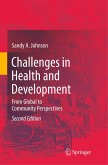Despite the emphasis of the European Regional Policy on territorial cohesion, regional disparities have been increasing within Europe in the past years. The metropolitan areas in almost all countries are considerably growing while regions outside of agglomerations are stagnating or even declining. Against this background this book aims to provide an understanding of the underlying processes of polarisation and related regional and local policies.
This open access volume contributes to the debates about polarisation and regional development by focussing on questions of spatial justice, power distribution and policy transfer. Theoretical and empirically grounded contributions show that European policies are indeed reproducing socio-spatial inequalities instead of challenging them. The book shows further the existing potentials and limits of individuals, economic, political and civil society actors to respond to polarisation on the regional and local level.
In this book conceptual thoughts on polarisation, regional policy and regional development are combined with empirical research and resulting implications for policymaking. As such, it is a valuable source for early career students and researchers as well as professionals in the field of regional and economic development, policy consultants, and policy makers.
This open access volume contributes to the debates about polarisation and regional development by focussing on questions of spatial justice, power distribution and policy transfer. Theoretical and empirically grounded contributions show that European policies are indeed reproducing socio-spatial inequalities instead of challenging them. The book shows further the existing potentials and limits of individuals, economic, political and civil society actors to respond to polarisation on the regional and local level.
In this book conceptual thoughts on polarisation, regional policy and regional development are combined with empirical research and resulting implications for policymaking. As such, it is a valuable source for early career students and researchers as well as professionals in the field of regional and economic development, policy consultants, and policy makers.
"I wholeheartedly recommend this book, not only for scholars in the fields of regional development and policy, spatial planning and geography, but for all those who want to better understand the spatial dynamics of contemporary Europe." (Szabolcs Fabula, Hungarian Geographical Bulletin, Vol. 68 (4), 2019)
"The book is timely and highly relevant for the current debates around re-imagining the Cohesion Policy. ... The volume is of interest and a useful resource for all those searching to understand regional inequalities as a 'relational, multi-dimensional and multi-scalar concept', as well as for those interested in conceptual and policy alternatives to current framework of Cohesion Policy." (Mihail EVA, Eastern Journal of European Studies, Vol. 10 (1), 2019)
"Thebook makes a valuable contribution to the burgeoning debate on socio-spatial polarisation, especially with respect to our understanding of the specificities of CEE countries, where sub-national administrative capacity and civil society organizations are nothing like western-centric scholars imagine them to be." (Kevin Morgan, Eurasian Geography and Economics, June 20, 2019)
"The book is timely and highly relevant for the current debates around re-imagining the Cohesion Policy. ... The volume is of interest and a useful resource for all those searching to understand regional inequalities as a 'relational, multi-dimensional and multi-scalar concept', as well as for those interested in conceptual and policy alternatives to current framework of Cohesion Policy." (Mihail EVA, Eastern Journal of European Studies, Vol. 10 (1), 2019)
"Thebook makes a valuable contribution to the burgeoning debate on socio-spatial polarisation, especially with respect to our understanding of the specificities of CEE countries, where sub-national administrative capacity and civil society organizations are nothing like western-centric scholars imagine them to be." (Kevin Morgan, Eurasian Geography and Economics, June 20, 2019)








